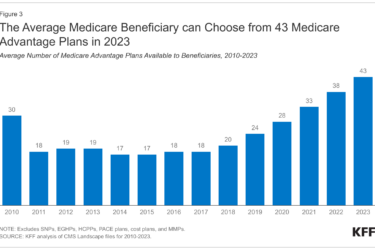It’s time to bone up on Republican proposals for overhauling Medicare and Medicaid, and how they compare with the Democrat’s alternatives.
Mitt Romney’s selection of Paul D. Ryan as his running mate ensures that both government programs – as well as Social Security, a topic for a future post – will be front and center in the presidential contest. And it’s our job, as journalists, is to help the public make sense of what’s at stake.
Political reporters will write about the horse race between candidates at the national, state and local level; your challenge is to write about older Americans and how they would be affected by the policies discussed.
Today, I’ll point you toward some resources that might be of help.
Keep in mind there are very few truly impartial sources of information in this overheated political environment. Carefully weigh and balance the information that comes your way and consider the positions of organizations releasing data or offering commentary.
You’ll perform a valuable service if you help readers understand how to think about the debates over Medicare and Medicaid that are sure to unfold over the next several months.
A note of caution is in order: Although Ryan’s positions on Medicare and Medicaid are well documented, Romney has not embraced those policies. When Romney makes his policy stance clear, that will be news. But don’t make any assumptions about what the presumptive Republican nominee is going to do before he makes it very clear just what that is.
Medicare
Ten years from now, Ryan would convert Medicare to a “premium support” program. (See AHCJ’s tip sheet on premium support.) People would get a certain amount of money, which hasn’t been specified, to purchase Medicare coverage from private insurers or to buy traditional Medicare provided by the government. Annual growth in premium support payments would capped and tied to annual economic growth. Gradually, the age at which people qualify for Medicare would be raised from 65 to 67.
By contrast, Democrats would retain traditional Medicare but reform the program by overhauling reimbursement for providers, encouraging innovations in service delivery and introducing incentives to deliver better quality, lower-cost care. Whether these incentives, innovations and payment reforms will achieve these aims is far from established. If they don’t work, costs will continue to spiral upward to what many observers claim will be unsustainable levels.
Last month, the Kaiser Family Foundation published an analysis of various premium support proposals for Medicare, including Ryan’s.
In June, AARP’s Public Policy Institute published an overview of leading options being considered for reforming Medicare.
See Ryan’s broad-ranging “Path to Prosperity” budget proposal, which includes his Medicare and Medicaid proposals. The Congressional Budget Office evaluated Ryan’s proposal – a key finding was that seniors would pay more for coverage under his plan than under traditional Medicare.
The Los Angeles Times took a look at the debate over Ryan’s Medicare proposals this weekend; you can read that newspaper’s well-done article here. Veteran health journalist Robert Pear of The New York Times examined the issue. The Washington Post looked at the politics of Medicare and how it might play out for both parties. Also worth looking at is the Washington Post‘s fact-checking analysis of rhetoric surrounding the Democrats’ plan to reduce Medicare spending by $500 billion and an analysis by a Boston Globe commentator.
Last but not least, Kaiser Health News has been keeping a close eye on Ryan’s Medicare proposals for many months and has a comprehensive set of articles and related materials. (Full disclosure: I’m a contributing writer for Kaiser Health News.)
Medicaid
State Medicaid programs, run with funding and rules set by the federal government, are the single most important payer for nursing home care for seniors.
The Affordable Care Act contains provisions designed to expand community-based long-term care options for seniors as well as initiatives designed to improve care for so-called “dual eligibles” – impoverished seniors, many with multiple chronic medical conditions, who have both Medicare and Medicaid coverage.
Ryan would repeal the Affordable Care Act and convert Medicaid to a block grant program from its current status as an entitlement program. With entitlement programs, everyone who qualifies for benefits gets them and the amount spent on beneficiaries isn’t fixed in advance. With block grants, the spending is capped and benefits aren’t guaranteed.
Ryan claims the change would give states more flexibility to run Medicaid as they see fit and better respond to local conditions, but significant cuts in funding would be part of the equation. It’s not clear what federal rules would govern Medicaid under the block grant structure Ryan is proposing or how those would compare to existing regulations.
(Note that by repealing the Affordable Care Act, Ryan’s plan would end up reinstating the dreaded “donut hole” in Medicare drug plans, which is due to be eliminated gradually under that legislation.)
I haven’t seen a lot written specifically about the implications for dual-eligibles and seniors who receive long-term care services. Until think tanks and other organizations start producing those reports, you can get in touch with National Academy for State Health Policy (try their director, Alan Weil), AARP’s Public Policy Institute or the National Association of State Medicaid Directors and see what they think.
Both the Republicans and the Democrats seem to favor more managed care for dual eligibles because this population is such a big driver of health care costs. Differences may lie in how fast the move to managed care occurs and the federal role in oversight, but this hasn’t been spelled out with any specificity. Note that the Obama administration has come under criticism recently for its plans to roll out a managed care pilot program for dual eligibles in the states.
So far, the general debate over block grants and Medicaid funding cuts that would ensue has gotten much more attention. Of course, reduced funding would have serious consequences for everyone who depends on Medicaid.
 Judith Graham (@judith_graham), AHCJ’s topic leader on aging, is writing blog posts, editing tip sheets and articles and gathering resources to help our members cover the many issues around our aging society.
Judith Graham (@judith_graham), AHCJ’s topic leader on aging, is writing blog posts, editing tip sheets and articles and gathering resources to help our members cover the many issues around our aging society.
If you have questions or suggestions for future resources on the topic, please send them to judith@healthjournalism.org.
The Center for Budget and Policy Priorities, a left-leaning group, looked at the topic and concluded the policy would shift costs to the states. The Kaiser Family Foundation examined the implications of block grant proposals for Medicaid. Kaiser Health News ran a story about how Medicaid block grants would work and a “point counterpoint” piece from an advocate and critic of block grants for Medicaid.
In the spirit of cooperation, please let me know of other important resources out there that might be of help to journalists. Drop me a line at judith@healthjournalism.org or include the information in the comments section.









